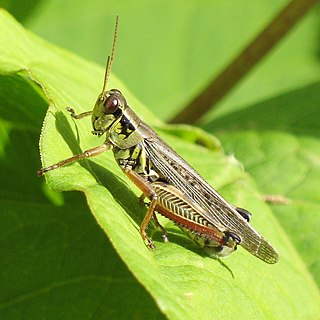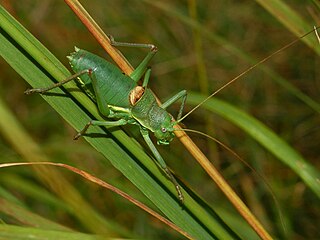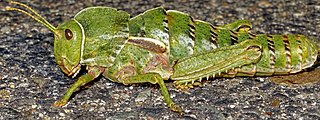
Gryllinae, or field crickets, are a subfamily of insects in the order Orthoptera and the family Gryllidae.

Melanoplus is a large genus of grasshoppers. They are the typical large grasshoppers in North America. A common name is spur-throat grasshoppers, but this more typically refers to members of the related subfamily Catantopinae.

Oecanthus is a genus of cricket in subfamily Oecanthinae, the tree crickets.

Spilostethus pandurus is a species of "seed bugs" belonging to the family Lygaeidae, subfamily Lygaeinae.

Calliptamus siciliae, commonly known as the pygmy pincer grasshopper, is a species of short-horned grasshoppers belonging to the family Acrididae subfamily Calliptaminae.

Gryllomorpha dalmatina, common name wingless house-cricket, is a species of cricket belonging to the family Gryllidae subfamily Gryllomorphinae.

Yersinella raymondi, common name Raymond's Bush-cricket, is a species of "katydids crickets" belonging to the family Tettigoniidae subfamily Tettigoniinae. The scientific name Yersinella comes from the name of the entomologist who has described the species in 1860.

Oecanthus pellucens, common name Italian tree cricket, is a species of tree crickets belonging to the family Gryllidae, subfamily Oecanthinae.

Barbitistes obtusus, common name Southern Saw-tailed Bush-cricket or Alpine Saw Bush-cricket, is a species of katydids crickets in family Phaneropteridae subfamily Phaneropterinae.

Brachytrupes megacephalus is a species of cricket in the family Gryllidae.

Grylloidea is the superfamily of insects, in the order Orthoptera, known as crickets. It includes the "true crickets", scaly crickets, wood crickets and other families, some only known from fossils.

Agraeciini is a large tribe of bush crickets or katydids in the conehead subfamily, Conocephalinae.

Ephippiger perforatus, the North Apennine saddle bush-cricket, is a species of insect in the family Tettigoniidae.

The Orthopteran subfamily Aemodogryllinae contains about sixteen genera of camel crickets. It was named after AemodogryllusAdelung, 1902 - which is now considered a subgenus of Diestrammena.
Trellius is an Asian genus of crickets in the family Phalangopsidae, subfamily Phaloriinae, tribe Phaloriini.
Micrornebius is a genus of crickets in the subfamily Mogoplistinae, tribe Mogoplistini.
The Sclerogryllinae are a subfamily of crickets, in the family Gryllidae, based on the type genus Sclerogryllus. They may be known as "stiff-winged crickets" are terrestrial insects, distributed in: tropical Asia, Korea, Japan and West Africa.

Pamphagus sardeus is a large species of Pamphagidae and one of the most massive Italian Orthoptera.

Svercus palmetorum is a small species of cricket.

Natula averni is one of the smallest and most elusive species of cricket living in the Mediterranean Basin.


















